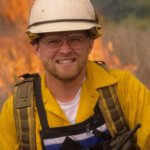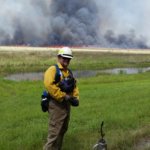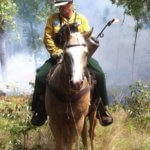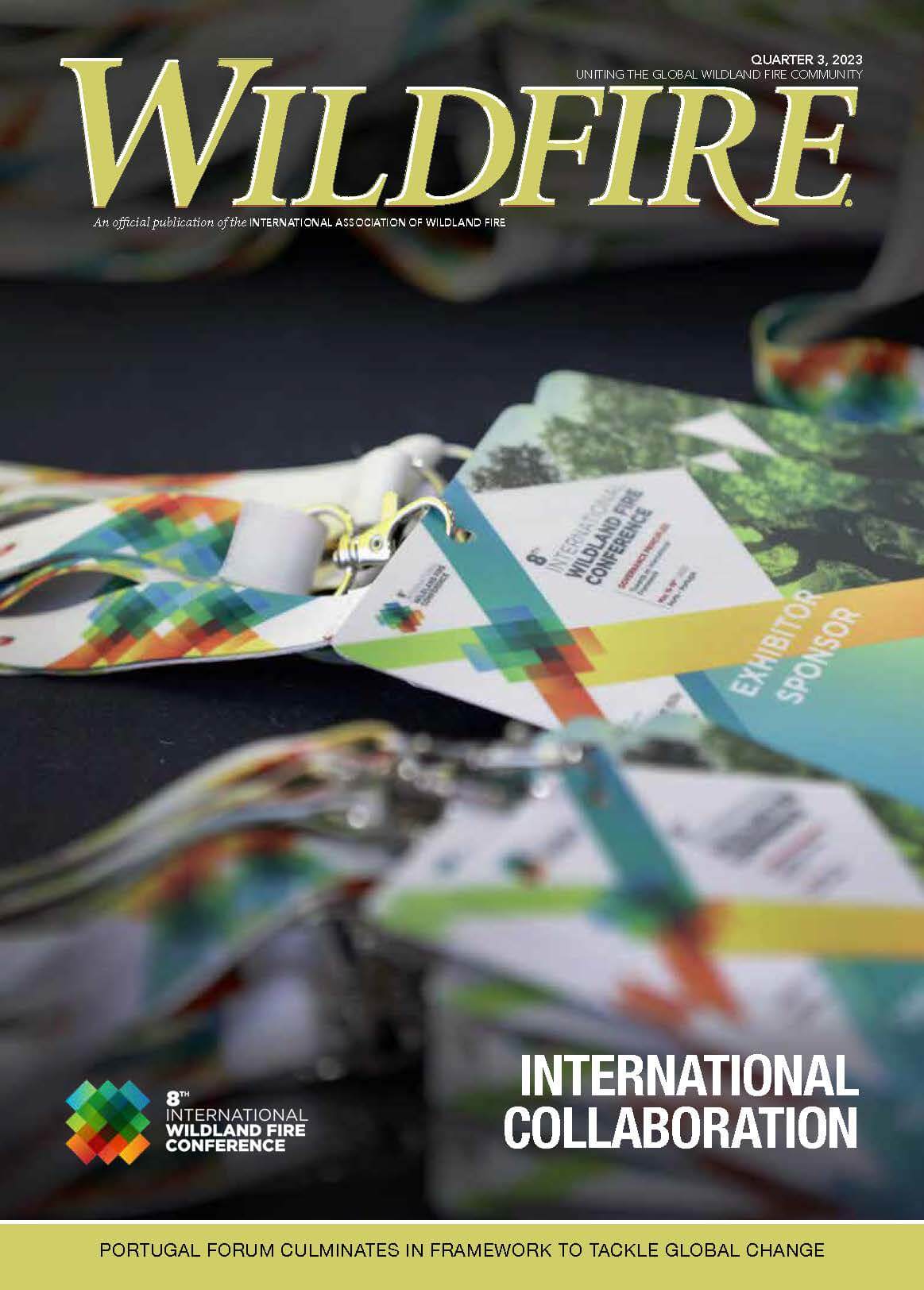Tell us about your career, what attracted you to it, and throughout your career was there a favorite position?
My dad was an engineer and one time I asked him why he didn’t encourage me to be an engineer, and he said that I was the first person he ever met who knew in the 3rd grade what they wanted to do, which was to have a career in forestry. So, I went to Stevens Point and had a great time there, and when I got to the Texas Forest Service, they introduced me to fire. I have had the opportunity to introduce people to fire, many of them have embraced it and made it a part of them, and only 3 cases who said, yep, that must be fire and walked away from it and they were done with it. I was one of those people who recognized it for what it was, as far as the ability to paint or mold landscapes and how effective it is at so many things. I became a firm believer in wise fire use. It was there in Texas where I developed this relationship with fire. After Texas, I worked for what was then the Florida Division of Forestry for nearly five years. My last position with them was a fire control supervisor, so I was responsible for prescribed fire and wildland fire suppression in the Jacksonville area. That gave me a bigger picture to the importance for managing fuels in the wildland urban interface. When I came to over to the Water Management District, the program was part of the land acquisition staff, acquisition was the focus and management was an afterthought. Because of this, when I arrived, I was able to be part of the team who built the land management program. I was able to take the things I had learned and implement them, use that experience to mold a program that could capture all the good points and avoid some of the chaff that we’d had the opportunity to observe. When you asked where I have fit best and enjoyed the most, it is my current position because we are molding landscapes on a huge scale, and I’m blessed to work with a really effective team. This is where I think I am supposed to be right now.
Do you have an accomplishment you are most proud of and what do you think might be your most rewarding accomplishment?
You mean beyond earning the Excellence in Fire Management Award from my peers? It is always an honor to be recognized by your peers, because they know what you do best. Many people still think that when we work in fire, you sit in a fire tower and look out over the forest, they don’t realize it has more depth than that. When you are recognized by your peers who know what it takes to do what you do, it means so much more.
As you worked through your career, what were some of the biggest challenges you faced?
My first time as an Ops Chief out West, in 2000, Montana was facing a firestorm similar to what they were facing this year (2017). Resources were spread thin. We were supposed to get this little fire in Idaho and instead they had a serious problem in Townsend, MT so they sent our team over there. They gave us the briefing and basically told us that the standard tools won’t work because we are that dry and frankly we don’t have enough of the standard tools to make a difference anyway, so good luck. We were able to pool some of the resource we were assigned. One of the challenges was that the cattlemen were concerned about the grasslands. They wanted us to know that their houses were insured, what they really wanted us to protect was the grass. That was counterintuitive, but our staff had some experience in agriculture, so they bonded with the ranchers, and suddenly everything started to come together. All of the sudden a light bulb came on, and things turned a corner, and everything worked out and ended successfully. That was one situation that was a really big challenge that we were able to overcome.
How do you feel, in general, about the Wildland Fire Management Program today and what issues and challenges do you see facing us?
I recently completed my Master’s degree, and the last class I took was Managing Public Lands and Waters. In that course we looked at what Pinchot was trying to do when he was establishing the Forest Service. He looked for people who were connected to their community, had a good skill set and could make good decisions. He tended to empower them because they were going to be a long way from Washington DC, and they were going to have to make good decision without a lot of communication. I think the system has come a long way from that. There is improvement in some ways, we have more tools in the toolbox. But I think we’d strayed away from that path of getting the right people in place and empowering them and helping them to grow with training and opportunities. I would hope we would get back on the track where people were empowered to make decisions, and we are investing in people and their long-term careers. If you provide an employee with really good working environment where they feel like they are contributing and making a difference, and then you nurture that feeling and you support it with training and growth, that is a successful model and I feel we have strayed a bit from that successful model.
At the Fire Behavior and Fuels Conference in Portland, when we were linked to the folks in Australia, one of the speakers in Australia said – you know, “You American’s work fire like you play football, when you are on offense you have one group of people out on the field playing offense and when you are on defense you have a different set of people out there. When you switch back and forth, some of the site specific, or time sensitive information is not transferred from one team to the next.” He said “We (Australians) approach fire much like we play football, it is the same people on the field whether they are playing offense or defense, they just switch roles, but the same people stay there.” I think we could learn from that, it seems like prescribed fire is in one camp, and suppression is in one camp, and people focus on one or the other. There are different sets of rules and different ways of making decisions. Quite possibly we should take a lesson from the Aussies, and work fire like they play their football, soccer, and have the same people on the field whether they are doing prescribed burning with the same guidelines as if they are working suppression.
If you were to look at what you do in your job, and new people coming into the profession, is there any particular skill or knowledge set you could add to make yourself and others do their job better?
I remember going through High School and College, and when I went with my daughter when she was picking a college, people thought all the students who didn’t like to talk to people should go into forestry and wildlife. Today, I don’t think anything could be further from the truth. People working with natural resources need to be able to communicate clearly with the people they encounter, whether they are people in the community, a lessee on the property, managers, or politicians. Land managers, forester, fire managers need to be able to communicate what they are doing and why it is important to you! So, they need strong communication skills. And the other thing is Geographic Information System, GIS is what I recommend to new students. I used to say Air Photo Interpretation, but now GIS has replaced that. These are both absolutely essential skills for people who want to be successful in lands management or fire management.
Do you have anyone who has been an inspiration to you who has helped you get where you are?
I have two. The first one is the first IC I worked with, Doug Voltolina Sr, he was a district manager with Florida Division of Forestry out of their Bradenton office. Doug had the ability to identify talent and then he would provide them with opportunities to grow. When I would get a phone call from Doug, it was always a good news/bad news situation. The good news was, it was going to be a great opportunity for you, the bad news was that it was going to be an inch outside your comfort zone. He had the ability to see in people more then what they thought themselves capable. You were always challenged, but there was always enough safety in there.
The other is Dale Wade, he sees people who are in places where they could stay and be comfortable, but he encourages them to broaden their horizons and dig deeper for more information. When I would tell him about something we had gotten done, he would say, that’s really good but have you looked at this? That is a really good thing to have around, it is easy to become comfortable, but it is good to have a coach who can tell you how to get one more notch up or one more mile down the road.
Do you have any advice you would offer to anyone aspiring to be successful in the wildland fire management discipline?
Stephen Pyne said this specifically about Floridians, but I think it has application on a much broader level, he said– “they, Floridians know that in the public eye, if one of them fails, they have all failed, elsewhere fire divides, in Florida it joins people together.” I don’t think this is unique to Florida, but I think it has a really good message. Often people get worried about their turf or they become siloed or protective and have boundaries, when in fact if we were all working together we are going to be able to achieve so much more, and it doesn’t matter who gets the credit. What matters is the final outcome on the ecosystem, have we made the world a better place. And if we can say we made the world a better place, we can move on to the next mission, that’s great!
Do have any favorite quotes or words to live by?
I have what I refer to, Steve’s Parade Theory of Life. When we are born we join a parade that is our family. When we begin our careers, we join a parade that is our profession. At the front of the parade there are people who have gone before us, they’ve learned lots of things, they served as our teachers, they served as our mentors. They lead us through our families and our careers, and over time they begin to retire and in our families, they begin to pass away. As you are going through your life/career, you don’t really think you are necessarily moving forward in the parade, but you’ve been busy, then one day you look up and you realize that the front of the parade is pretty short, and the back of the parade is pretty long. At that moment you may lament the loss of all those people who were your mentors or teachers. It would be easy to become lost yourself because that leadership is gone. It is at that point, that you turn around and look at the back of the parade and you realize that your responsibility has shifted from learning from the people in front of you, to teaching and leading the people who are behind you in the parade. It is at that point where much of your focus shifts from building your career to helping other build theirs. Going back to my two leaders who served as an inspiration to me, they did this well.
Any thoughts on the role and importance of the IAWF and how the association can help the wildfire organizations accomplish their missions?
I think Steve’s Parade Theory of Life highlights the role of the IAWF. It is a mechanism like a switchboard operator for connecting some of the people who are at the front of the parade with some of the people who have recently joined the parade. I think, if we can convey some of the lessons we learned, we will be able to help people go further down the track, because they start with more knowledge and wisdom because we shared it with them. I think IAWF has the ability to connect people throughout the length of the parade.



